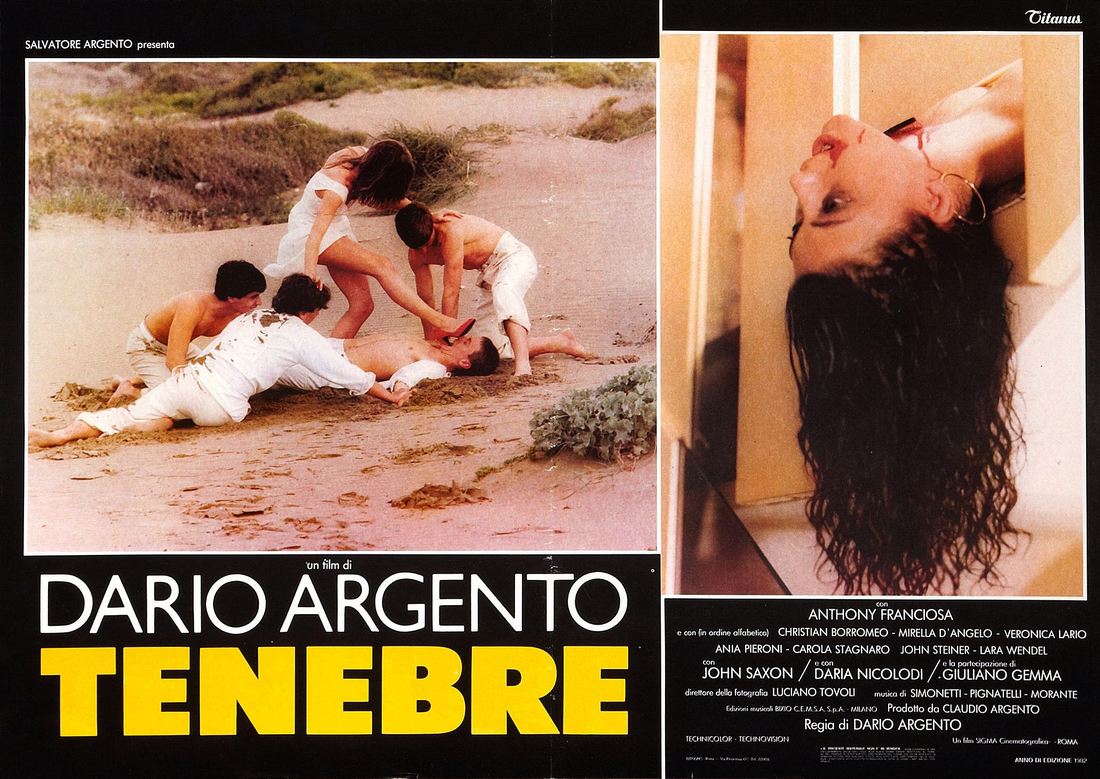The film follows Peter Neal, an American crime novelist, as he travels to Italy on a book tour. Shortly before he arrives, a young shoplifter is murdered, and pages of his latest novel, Tenebrae, are stuffed into her mouth. The killer, who seems to be literally and figuratively taking a leaf from Neal's book, begins sending threatening letters to the author, as people close to Neal are dispatched one-by-one.
I say Tenebrae is a near-masterpiece, because it's not perfect. The central idea-maniac seeks to eliminate all traces of perversion from Rome-is fine, but the mechanics of the plot are fairly weak. Argento references many great crime writers in his dialogue-Christie, Spillane, Conan Doyle-which only goes to show how shallow the investigative aspect of his own plot is.
There's no investigative progression, in the same way there is in his earlier gialli (even though the investigations in those films often amounted to little more than wild goose chases to [enjoyably] pad out the films), and the plot basically goes all-in on its central twist; the elimination of the original killer, with a second killer assuming the role. The first killer is identified through a form of word association by Neal and his assistants, and the second killer is tracked down by the film's two police characters, who, separately, uncover relevant evidence off-screen. So, in effect, the detective aspects-despite the film's containing three characters who are actively investigating the murders-are sorely lacking, and play second fiddle to the elaborately conceived, and staged, set pieces.
The interplay between Neal and the police is worth examining. Any giallo which contains both amateur and professional sleuths has to make a decision on how much co-operation to allow between the two factions. Notionally, the police are far better resourced to follow up clues and incriminating evidence, but the films wouldn't be as interesting if the amateur sleuths turned their evidence straight over. Most films, taking the lead from Argento's own Bird with the Crystal Plumage, position the amateur protagonist in opposition to the police, who suspect them of being involved in the murders. Thus, they have to conduct their own investigation to clear their name. (The fact that they can usually carry out these investigations free from police observation casts some doubt on my earlier assertion that the long arm of the law is better equipped to close out these cases.)
In Tenebrae, the police initially view Neal with some suspicion, but quickly come around to asking him for help. Even though there's some residual antagonism between Neal and Giuliano Gemma's Inspector Germani, is it really enough to justify Neal and his young assistant taking it upon themselves to investigate their lead suspect, crazy conservative literary critic Christiano Berti? Neal does stare into the middle distance as he considers the acclaim which will be his if he cracks the case on his own (with other thoughts also brewing), and this moment is crucial. It shows Neal's megalomaniacal side, which soon loses its megalo aspect, and his desire to be the author of his own narrative. Ultimately, this matters to him far more than actually catching the killer (and his own narrative soon branches off in a completely different direction). Similarly, Argento, who many believe created Neal in his own image, is less concerned with the logical investigative process than his big twist, and, especially, the elaborate murder scenes which bear his fingerprints in every frame.
There are moments of clunky humour-witness the news reporter cracking jokes at the site of a teenager's murder-and Argento isn't above the old 'every character acts suspiciously' device to misdirect us. Some of the dialogue isn't great, and the acting occasionally jars. However, none of this matters; in fact, the film almost seems better, more unnerving and unsane (its original American title) for containing these imperfections of tone and execution. The Louma crame shot, in which the camera slowly, and slightly clunkily, moves over and around the apartment in which two lesbians are about to be murdered, is the perfect example of this. The camera doesn't quite glide as smoothly as Argento would have wanted, but it gets the job done, and the shakes and stutters only remind us of the human hand guiding it. Normally this would be a bad thing, and would remind us of the artifice of the film we're watching, but because that hand is Argento's, we can glean no comfort from this knowledge. As the score (which similarly is a sometimes-odd fit for the images in this scene) amps up and the camera comes to rest outside one of the windows, gloved hands appear in frame to cut through the blinds. In this moment, the hand behind the camera and the hand of the killer become one and the same.* And there was no hand more more wayward, no hand more brilliant, and no hand better placed to guide us through the darkness of this ultra-bright film, than Argento's. Not even Peter Neal himself comes close.
|
|
*Quite literally, in that Argento was the hand double for all his killers at this time.
|

 RSS Feed
RSS Feed
